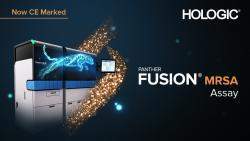
Part of the Panther Fusion and Aptima assays, the new Panther Fusion MRSA assay will accurately detects and differentiates Staphylococcus aureus (SA) and methicillin-resistant Staphylococcus aureus (MRSA) DNA from ESwab nasal samples.
Designed to use in any size laboratory, the Panther Fusion system is said to offer all the benefits of the Panther platform, including full sample-to-result automation.
Hologic EMEA diagnostics vice president João Malagueira said: “The launch of the Panther Fusion MRSA assay demonstrates our commitment to expanding the portfolio of assays available for Panther Fusion, enabling our European customers to deliver a better service to their clients and ultimately to patients.
“With rising antibiotic resistance in Europe and the threat posed by healthcare-associated infections to public health, our new assay will help customers provide a rapid service to hospitals, so cases of resistance, such as MRSA, are identified and managed quickly and effectively.”
The assay, which can correctly identify empty cassette variants, has broad strain inclusivity, including the Bengal Bay clone.
Laboratories can aggregate women’s health, virology, respiratory, hospital-acquired infections, and open access tests on the Panther Fusion system.
The system holds capacity to run up to 32 different assays at the same time.
Additionally, the MRSA samples can be loaded directly into the Panther Fusion, enabling to save customers vital time and labor costs.
Panther Fusion helps labs to process up to 500 Panther Fusion and Aptima assays in an eight-hour period.
Panther Fusion is available as a full system or its module can be attached to existing Panther systems in the field to expand testing capabilities.
Panther Fusion module enables to run polymerase chain reaction (PCR) assays and tests based on transcription-mediated amplification (TMA).
Its benefits include the capacity to run multiple tests from a single sample, random and continuous access, sample processing with rapid turnaround time, continuous loading, and STAT capabilities.






